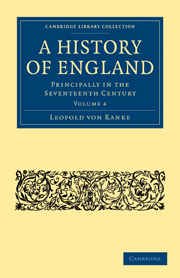Book contents
- Frontmatter
- Contents
- BOOK XVI THE LATER YEARS OF CHARLES II, 1675—1685 WHIGS AND TORIES
- BOOK XVII REIGN OF JAMES II, FEBRUARY 1685 TO SEPTEMBER 1688
- INTRODUCTION
- CHAP. I Accession of James II. First sittings of a new Parliament
- CHAP. II Repulse of the Refugees
- CHAP. III Later sittings of the Parliament
- CHAP. IV Declaration of the Right of Dispensation The Ecclesiastical Commission
- CHAP. V The King and William Penn. Declaration of Indulgence
- CHAP. VI Preparations for securing a Nonconformist Parliament
- CHAP. VII Trial of the Bishops. Further projects
- BOOK XVIII THE FALL OF JAMES II IN ITS CONNEXION WITH THE EUROPEAN CONFLICTS WHICH MARKED THE CLOSE OF 1688
- BOOK XIX COMPLETION OF THE REVOLUTION IN THE THREE KINGDOMS, 1688—1691
CHAP. VII - Trial of the Bishops. Further projects
Published online by Cambridge University Press: 07 September 2011
- Frontmatter
- Contents
- BOOK XVI THE LATER YEARS OF CHARLES II, 1675—1685 WHIGS AND TORIES
- BOOK XVII REIGN OF JAMES II, FEBRUARY 1685 TO SEPTEMBER 1688
- INTRODUCTION
- CHAP. I Accession of James II. First sittings of a new Parliament
- CHAP. II Repulse of the Refugees
- CHAP. III Later sittings of the Parliament
- CHAP. IV Declaration of the Right of Dispensation The Ecclesiastical Commission
- CHAP. V The King and William Penn. Declaration of Indulgence
- CHAP. VI Preparations for securing a Nonconformist Parliament
- CHAP. VII Trial of the Bishops. Further projects
- BOOK XVIII THE FALL OF JAMES II IN ITS CONNEXION WITH THE EUROPEAN CONFLICTS WHICH MARKED THE CLOSE OF 1688
- BOOK XIX COMPLETION OF THE REVOLUTION IN THE THREE KINGDOMS, 1688—1691
Summary
Many had expected that the King, moved by the manifestations which had made themselves heard on all sides, would be content with the repeal of the penal laws, which was offered him, and would give up his demand for the abolition of the oaths, which seemed universally unpopular. The new promulgation of the Declaration of Indulgence which took place towards the end of April, 1688, undeceived people on this point. It not only comprised the earlier Declaration in its full extent, but was provided with a postscript in which special emphasis was laid on the intolerable nature of the oaths. The King says in this postscript ‘that a government had never yet maintained itself by limitations of this kind; offices and dignities ought to be distributed according to merit; his resolution was to establish universal liberty of conscience in England for all future generations; in next November at latest he would summon a new Parliament; and that he hoped to carry out his plan then. He demanded beforehand that the electors should then only choose such members as would be able to bring to an end that which he had begun for the advantage of the monarchy.’
We are assured by those who enjoyed the confidence of the court, that in this publication, as in his previous deliberations, the King was partly influenced by the prospect that an heir to the crown would soon be born.
- Type
- Chapter
- Information
- A History of EnglandPrincipally in the Seventeenth Century, pp. 342 - 366Publisher: Cambridge University PressPrint publication year: 2010First published in: 1875



